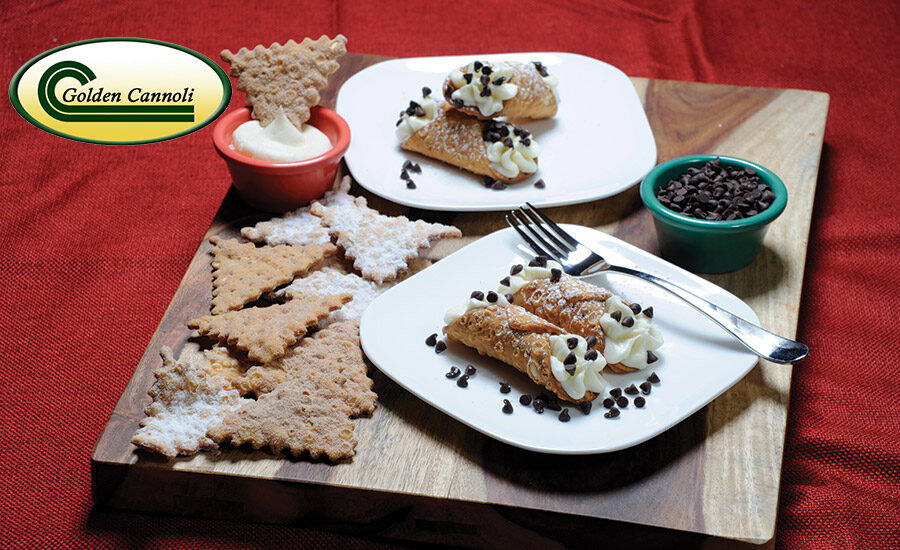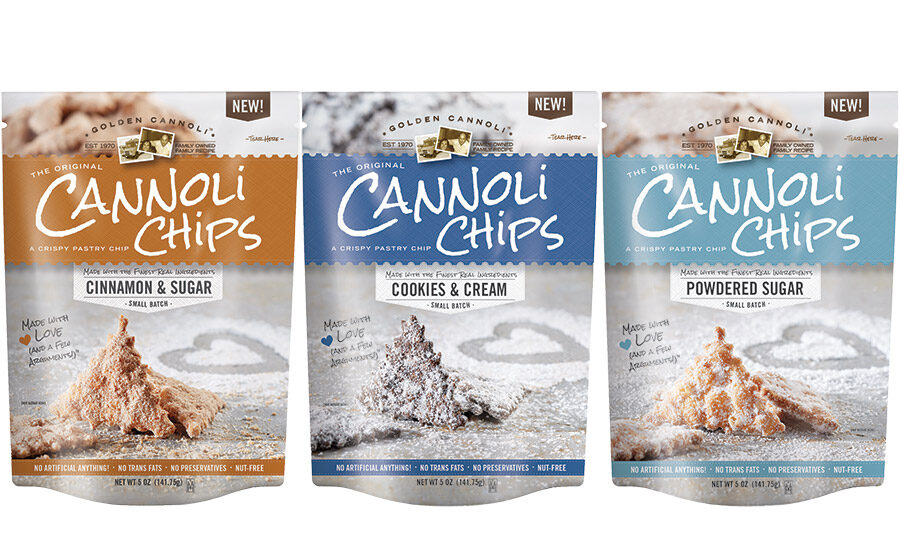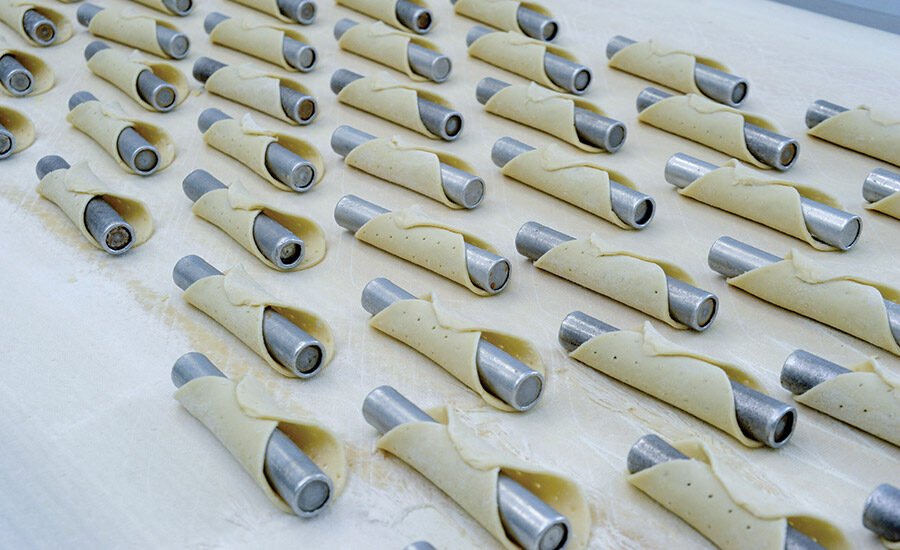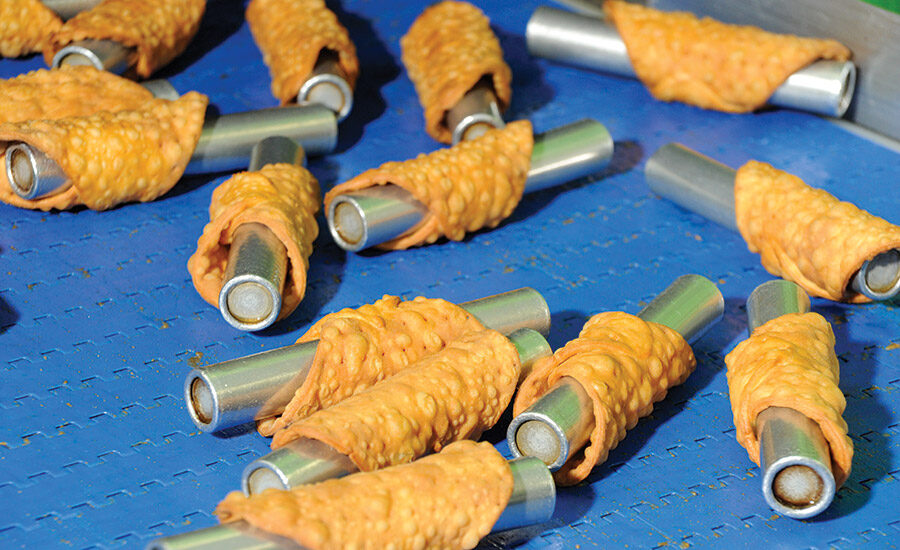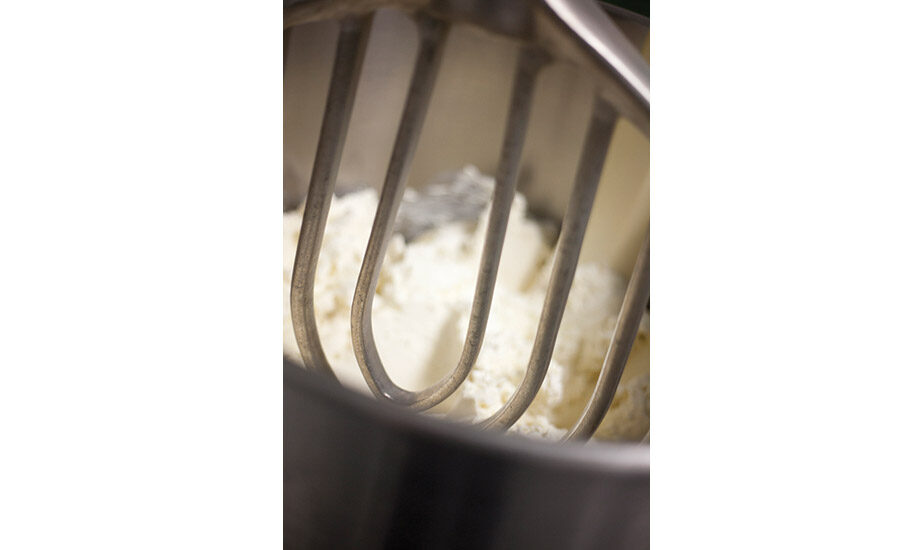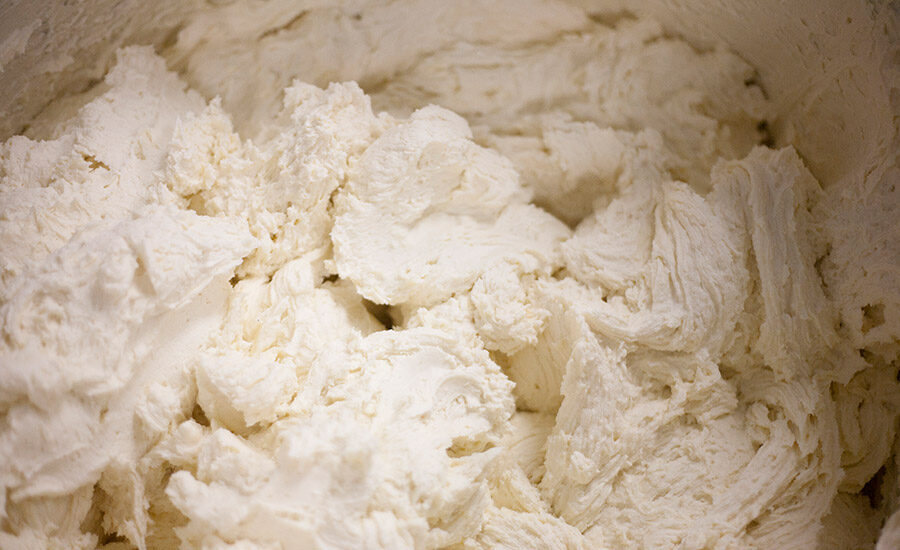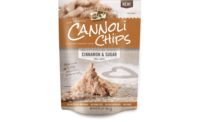Speak for any length of time with Valerie Bono, and you’ll hear about her passion for “increasing cannoli awareness.”
Valerie, owner/chief sales & marketing officer, Golden Cannoli, Chelsea, MA, has been on a mission to bring more—and diversified—cannoli products to the masses for some time now. And the significant growth of the company over the past few years is a strong testament to that mission.
Since Snack Food & Wholesale Bakery magazine named Golden Cannoli its Bakery of the Year in 2013, the company has tripled its sales numbers. Now the company is striding into new territory by bringing its Original Cannoli Chips to the snack aisle, sold in resealable stand-up pouches, thereby creating an entirely new segment of snacking.
Next-generation innovations
One of the key reasons behind this strong pattern of growth is the company’s adoption of a flexible manufacturing environment underpinned with innovation.
“Supermarket buyers and restaurant owners and chains are always looking for innovation,” says Valerie. “They’re always looking for not only quality products at a reasonable price, but they’re looking for a company that can take a call from them and say, ‘We want a cannoli, but we want it just a little different,’” she says, such as a different size, shape or flavor.
“Prior to the five or six years, we were never that company,” says Valerie. “We always had our straight case packs, our straight product. We didn’t really make any changes, because at the time we were growing and we were happy with our growth at 20–30 percent per year, and we didn’t need to innovate.”
Part of this shift in perspective began in the wake of an ownership change. In 2006, after four decades in the cannoli business, Golden Cannoli founders Francesco Bono and Angelo Bresciani passed ownership of the bakery to their children.
“Over the course of time, the next generation comes into play and everything gets thrown up and sort of shaken up a little bit,” says Valerie. “Today’s consumers want snacks, small serving sizes, different flavors, custom products, local ingredients, non-GMO—all the types of customizations that are necessary so you can continue to be competitive.”
While Golden Cannoli is one of the largest manufacturers of cannoli products in the world, many family businesses operate in the category. “We changed our business strategy and became the leading innovator in the cannoli category,” says Valerie. “We innovate before the need is there—we create the trend versus following the trend.” The combination of working with short lead times within a high-capacity, high-quality production environment has proven attractive to customers.
Brendan Rigby, research & development, believes that the time is right for a stronger diversity of cannoli products. “I feel like the entire food industry is in a bit of a renaissance period, where food manufacturing companies, product developers and consumers are really starting to learn more about the science of food and question previously accepted wisdom,” he says. “I think as a society we feel more empowered than ever before to experiment with new ingredients, flavors, cuisines and cooking methods. I think we’re in the right place at the right time to make beautiful new products.”
Cracking the code of cannoli silence
The rise of snacking in America has contributed to Golden Cannoli’s innovation process. “We don’t want to pigeonhole cannoli exclusively as a bakery or dessert item,” says Brendan. “Many consumers have great family memories tied to our cannoli, but we’re also experimenting with less-traditional applications. I think that we’re continually trying to find that perfect balance between respect for long-lasting family traditions and commitment to innovation and experimentation.”
It’s this forward-thinking cannoli perspective that’s driving the business forward—along with a touch of serendipity. The idea for the Cannoli Chips started at a trade show when they began to run short on samples at the booth and broke cannoli shells into pieces to dip into the filling to extend things. The feedback was immediate and overwhelming, and a new product concept was born.
For a few years now, Golden Cannoli has been successfully selling its Cannoli Chips in the in-store bakery (ISB), packaged with traditional cannoli filling as a dip—often with store branding. Its cannoli is also sold fresh in ISB cases, so the Golden Cannoli brand is often hidden behind the scenes.
But selling the product in traditional chip packaging—resealable stand-up pouches—is a game-changer. “You put them in a bag and it’s like you’ve just cracked the code of cannoli silence,” says Valerie. “Now we have buyers calling from all over the world.”
Unlike other cannoli companies who might remain cloaked in cannoli brand science, this new product line gets the Golden Cannoli brand in front of shoppers in a completely fresh and new way. And it’s directly tied to snacking.
Original Cannoli Chips, available in Powdered Sugar, Cinnamon & Sugar and Cookies & Cream, are hitting the snack aisle this August and September as part of a national rollout. The products were named as a finalist in the Most Innovative New Products awards at the 2016 Sweets & Snacks Expo.
Depending on the approach to packaging and product format, cannoli chips could also find a home in the cookie aisle. The classic neutrality of cannoli pastry dough opens itself to considerable variation in terms of topical flavor profiles and coatings or drizzles.
“Our innovation with this line has already started to expand into seasonal offerings, limited-time offerings and custom formulations for specific customers that want to just be a little bit different,” says Valerie.
A new world of opportunity is opening, and Golden Cannoli is just beginning to seriously flex its R&D capabilities.
Cannoli perfected
Quality control is central to the success of Golden Cannoli’s traditional cannoli products. Artisan sensibility comes through in the manufacturing process, as all cannoli shells are still hand-rolled onto cylinders before frying. And the company has such strong faith in its signature packaging process that it guarantees zero breakage for every order.
“The commitment to our mission of creating a mutually beneficial relationship between our customers, suppliers, team members and our community has positioned us as a premier manufacturer of gourmet desserts nationwide,” says Valerie. All products are trans-fat-free, natural and kosher, completely lacking preservatives and artificial flavors.
Traditional cannoli and filling, sold to retailers and restaurants throughout the U.S. and Canada, is still Golden Cannoli’s best-selling product. The business is split about equally between foodservice and retail customers, including private label.
This business diversification has proven valuable through the years. “When the economy started to go down, our retail sales went up because people stopped going out and eating dinner at restaurants, but they started going to supermarkets and wanting the same quality,” says Valerie. “Our sales went through the roof, because people started buying cannoli at the supermarket.”
In 2014, Golden Cannoli took a step toward improved convenience and began offering prefilled cannoli shells to retailers, shipped and sold frozen, ready to thaw and serve. Many retailers carry the products nationally.
Other convenience options have seen demand. “We have noticed a shift in grab-and-go,” says Valerie, “quick enjoyment for fewer calories. So we have focused on smaller serving sizes.”
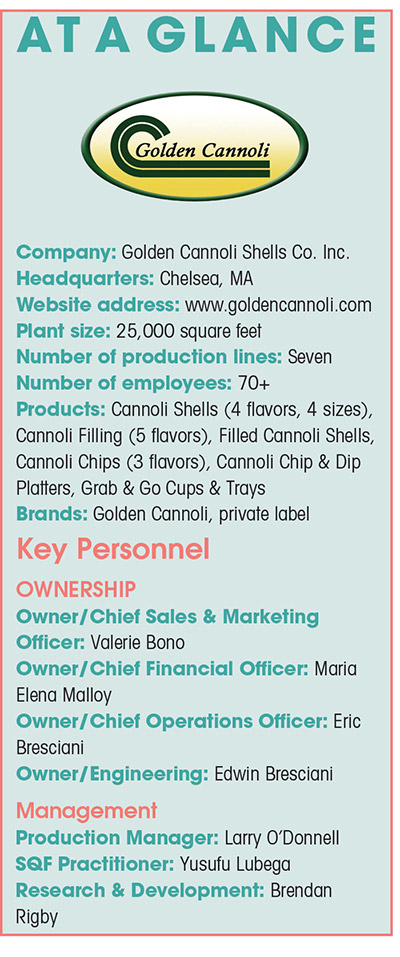 Operational refinements
Operational refinements
Sales growth at Golden Cannoli has long dictated bakery expansion and refinement through the years. The company founders, Francesco Bono and Angelo Bresciani, traveled from their home in Italy to Argentina—and eventually to the U.S. in the 1960s—with a plan to learn English, start a business and live the American dream.
“They never could have dreamed all this was about to happen,” says Valerie, Francesco’s daughter. One bakery soon grew into two, with the cousins finding success in selling their authentic, artisan cannoli to retail bakeries and restaurants.
“They began making cannoli shells in larger quantities,” says Valerie. “The unexpected demand was so tremendous.” In 1970, they moved to a larger building in Somerville, MA solely dedicated to making cannoli, and the Golden Cannoli business was born.
In 2013, Golden Cannoli moved into its current facility based in Chelsea. This summer, the bakery split its production space into two levels to significantly increase potential daily throughput. “Every time I feel we’re going to get settled, we build on another addition,” says Valerie. This recent renovation tripled the number of lines—some of which can run cannoli shells and/or chips—with the ability to install additional lines as needed which are already in the works. “The lines are semi-automated,” says Valerie, “but for shells, all of the folding and filling is done by hand to keep the artisan, handmade feel of the cannoli.”
The company has recently purchased and implemented millions of dollars in machinery to update operations and expand into new product areas. Dough preparation and processing are two areas that have seen improvements, as has the approach toward facility temperature control.
Valerie expects to continue to implement additional levels of automation within the year—as long as quality isn’t compromised. “There’s always something that’s going to be hand-done,” she says.
The facility is SQF Level 2 Certified and is working toward SQF Level 3 in 2017. This dedication to food safety sets Golden Cannoli apart from the pack. “This has brought us to a whole new level,” says Valerie. “We’ve launched scanning devices and control systems to make sure that we’re not making any errors. We code and track every item that comes in our facility, where it goes and when it goes out.”
All label creation is completed in-house so staff can quickly and easily modify ingredient statements for customized orders.
Improved sustainability is also ongoing. Valerie notes that adding solar energy generation is part of this planning, as is in-house recycling and installing bulk raw material storage to reduce energy consumption and waste. Golden Cannoli is dedicated to sourcing frying oils that are certified by RSPO (the Roundtable for Sustainable Palm Oil). Food waste in the plant is eliminated by grinding shells or chips that are broken during processing for sale to pie, yogurt and frozen dessert manufacturers.
Golden Cannoli continues to expand its footprint by adding square footage currently dedicated to warehousing, logistics and frozen storage, however shortly it will expand again in production.
This expansion will facilitate increased co-packing capabilities and growth of large, global accounts. And added production means added staff. “We have implemented a mid-management team and increased abilities to launch new items quickly and efficiently,” says Valerie. Adding more R&D and logistics staff is also in the works.
“We have also been working with advisors to create an aggressive business growth plan, and have met or exceeded each goal thus far,” says Valerie. “We have very high expectations.”
